2023 Global AI Enterprise Roundup! What Are the Most Profitable Directions for 2024?
-
2023 has been a year of rapid AI advancement.
Both tech giants and startups are exploring the potential of generative AI and deploying their own AI products. Goldman Sachs data shows that by 2025, global investment in the AI sector will reach $200 billion.
Investors are inclined to seek new opportunities and growth points in innovative fields like AI. Aileen Lee, a renowned American venture capitalist, once used the term "unicorn" to describe startups with short founding periods but valuations exceeding $1 billion.
The generative AI sector has seen the rise of several 'unicorns' that have demonstrated exceptional capabilities in financing, core products, and founding teams.
This year, why have these particular companies attracted significant investment? What AI directions are entrepreneurs diligently pursuing? And which AI enterprises are favored by capital? Top AI players have compiled a list of notable AI companies in 2023 by examining data from official websites, Crunchbase, Qichacha, and other sources, focusing on establishment timelines and investment information.
It's important to note that these companies aren't exclusively leading tech firms. Many listed companies had already been using artificial intelligence for product development before the AI boom in 2023. Additionally, some companies have gained significant investor interest through innovative applications, successfully entering the ranks of AI unicorns.
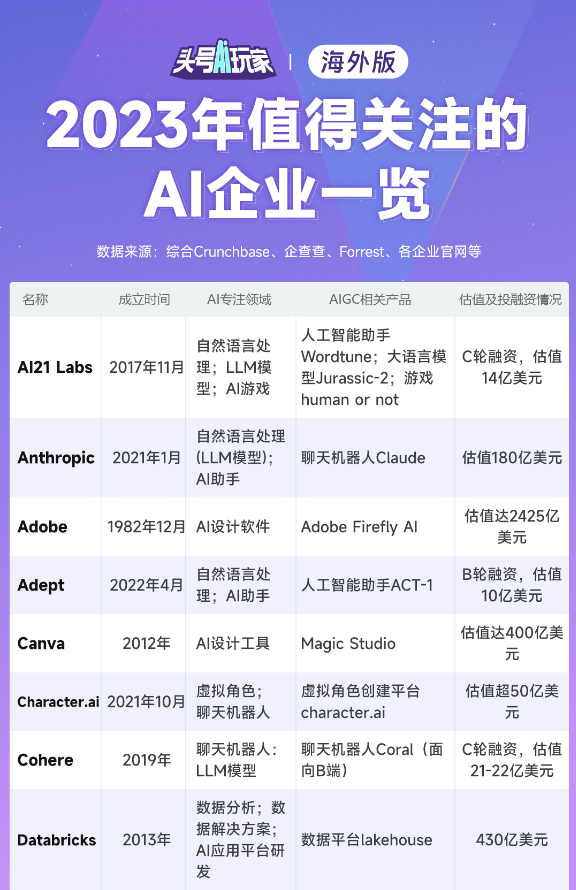
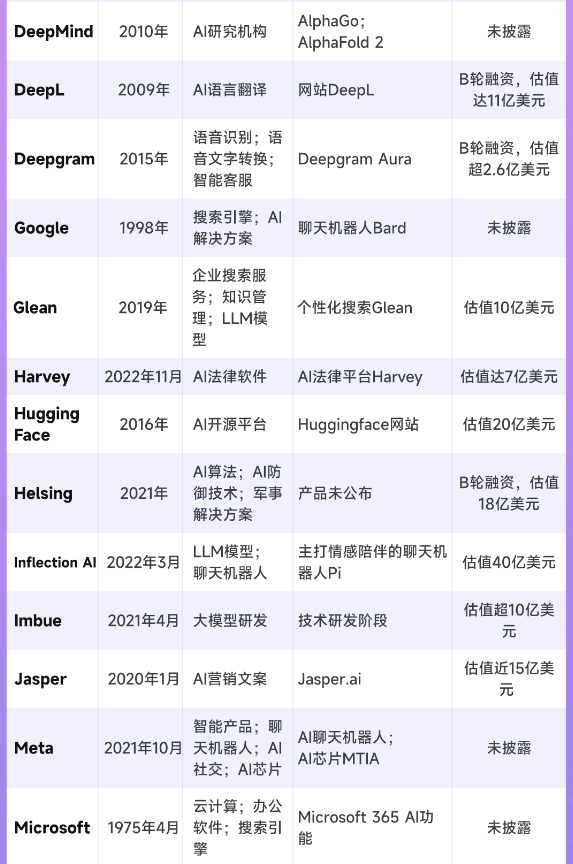
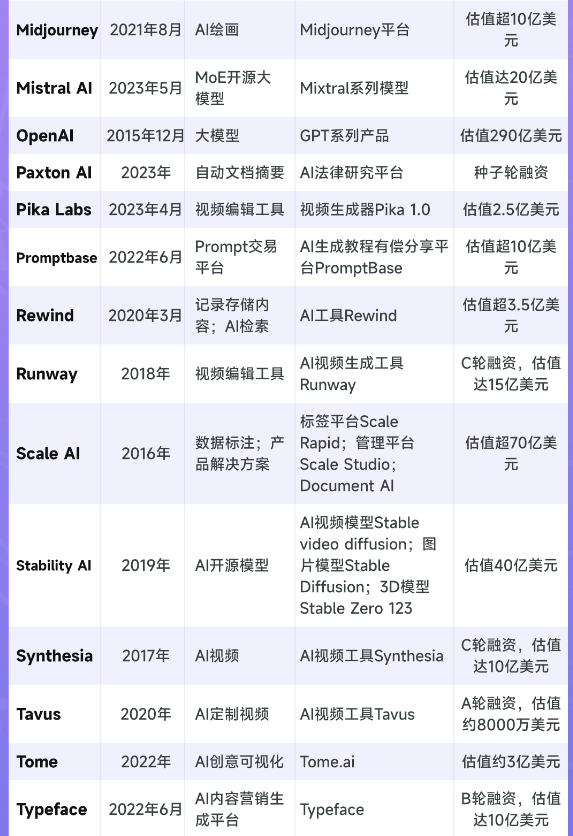

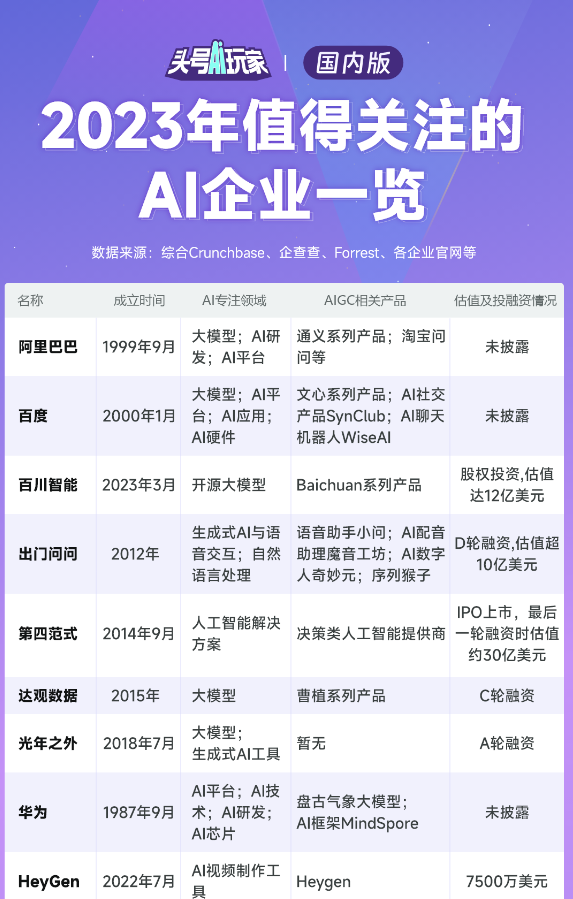
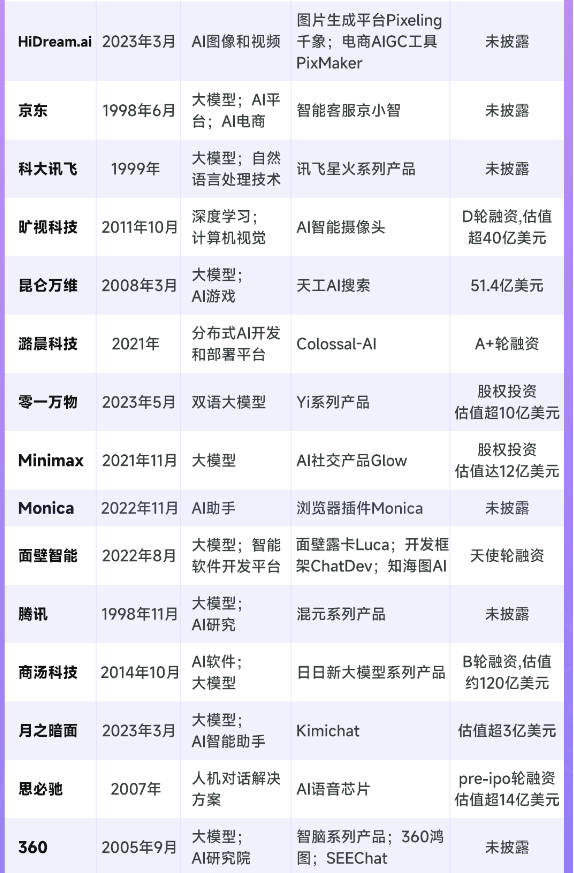
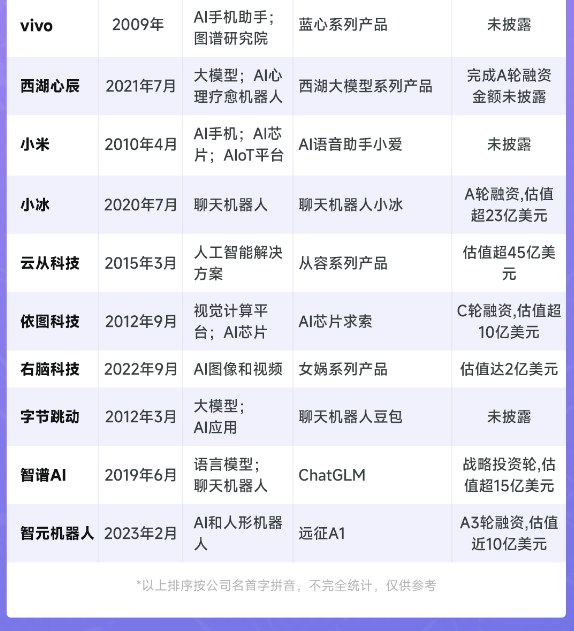
Chart: NUPD
In 2023, companies that have not ventured into large model development can hardly be considered at the forefront of AI.
Almost every other day, a new large model is officially announced in China, with a total of 238 models emerging within just eight months. This includes significant investments in large language models by internet giants such as Alibaba, Huawei, and ByteDance, while Baidu has even proposed an 'All in AI' strategy.
Against this backdrop, a group of dark horse startups has emerged in China, leveraging investor enthusiasm to establish sizable AI enterprises, such as Baichuan Intelligence, Minimax, and Zhipu AI.

Image source: Baichuan Intelligence official website
According to official data from Baichuan Intelligence, the company's latest funding round totaled $350 million, with investors including Alibaba, Tencent, and Xiaomi, making it the highest-funded vertical large model manufacturer in China. Meanwhile, Zhipu AI completed a 2.5 billion yuan financing in October 2023, and Minimax has completed three rounds of financing with a valuation of approximately $2 billion.

Image source: ZhiPu AI official website
According to the Qimingpian data report, China's AI sector raised a total of 21.4 billion yuan in 2023, with the aforementioned three startups accounting for over 30% of the total financing amount.
In addition to the substantial financing amounts and valuations exceeding $1 billion, these companies also boast star founding teams. It can be said that they possess technology, connections, and stable traffic, thereby gaining sustained attention.
In the wave of generative AI, several foreign unicorns valued over $1 billion have emerged. They have carved out their own space with AI tools.
Midjourney, a leader in the AI painting field, has released an image tool that operates entirely on the Discord platform, despite rejecting funding.

Image source: Crunchbase; Midjourney's monthly traffic
It relies on a subscription-based payment model, generating $100 million in annual revenue with over 10 million stable users.
Following Midjourney, many entrepreneurs have begun to enter the AI painting field, with several companies emerging accordingly. These include unicorn companies like Stability AI, valued at nearly $4 billion, as well as startups like StockAI, which folded just four months after its inception amid the AIGC wave.
The second half of 2023 was hailed as the dawn of the AI video era. While people were still marveling at the advancements in text-to-image technology, text-to-video companies began to dazzle the world, with notable examples including Runway, Pika, Synthesia, Tavus, and more.
Pika has already secured $55 million in investments, with lead investors including Adam D’angelo, CEO of Quora, and Clem Delangue, co-founder of Hugging Face.
"Top AI Player" once provided an in-depth introduction to Pika, highlighting how a combination of factors contributed to its meteoric rise. Often mentioned in the same breath as Pika is another AI video company, Runway.
Runway is actually one of the creators of the open-source software Stable Diffusion. With strong technical capabilities, Runway completed at least a $100 million Series D funding round in May this year, elevating its valuation to $1.5 billion.
On the other hand, two other video generation companies, Tavus and Synthesia, are also worth noting. Tavus, with its video generation solutions, has gained favor from Silicon Valley investment institutions such as Sequoia Capital and Y Combinator.

Wide application scenarios are a major reason for Tavus's success. Users only need to record a simple video, and Tavus can create thousands of video versions based on templates, tailoring videos for specific audiences. This allows Tavus to serve clients in various fields such as marketing, sales, and recruitment.
Synthesia once went viral with a 'David Beckham public service video'. Its product enables users to create videos as easily as making PowerPoint presentations and generate their own AI Avatars with a single click—the familiar 'digital humans' we know today.

AI digital humans can be considered the traffic magnet in the video domain. Some AI investors have mentioned that this year, only digital humans in the AI sector have turned a profit. Although this statement is somewhat exaggerated, it still highlights the commercial value behind AI digital humans.
Synthesia, a company focused on the digital human field, has recently completed its Series C funding round, achieving a market valuation of $1 billion. Synthesia's CEO disclosed that "the company currently maintains triple-digit growth."
"Overseas Unicorn" estimated Synthesia's revenue based on the CEO's disclosed data, indicating the company's annual revenue is approximately $100 million.
With enterprises actively deploying large models and the continued popularity of multimodal AI, the investment market believes multimodal AI will unlock more possibilities, becoming an essential pathway toward achieving artificial general intelligence.
For AI enterprises, is the future of generative AI about super AI covering all user needs, or personalized AI solving diverse demands? Their strategic AI directions might hold the answer.
On November 30, 2022, ChatGPT was launched. In just over a year, OpenAI has skyrocketed to become an AI company with annualized revenue exceeding $1.6 billion.
This year, OpenAI has faced more competitors.
In February 2023, Anthropic released Claude, a ChatGPT-like product, and made it freely available to users.

Claude official website homepage
In September 2023, Amazon announced a $4 billion investment in Anthropic. In October, Google stated it would add an additional $2 billion investment, bringing Anthropic's post-investment valuation to $30 billion.
Currently, Anthropic is setting its sights on building the most powerful AI 'Claude Next' today, with plans to raise an additional $5 billion in new funding in the future.
Besides Anthropic, other ChatGPT-like chatbots are also frequently making waves. Although they haven't gained global popularity like ChatGPT, they have still attracted significant attention, such as Inflection, Character.ai, and the rising star X.ai.
Inflection AI aims to create an AI product for emotional companionship, defining its robot Pi as "kind" and positioning it as a friend, confidant, or lover in human interactions.

Pi, a product by Inflection
Since its establishment in 2022, Inflection AI has secured investments from top-tier venture capital firms like Greylock, Microsoft, and Meta, reaching a valuation of $4 billion. Inflection has become the world's third most valuable AI startup, following OpenAI and Anthropic.
However, it's worth noting the three founders of Inflection: Mustafa Suleyman, co-founder of DeepMind; Reid Hoffman, partner at Greylock; and Karen Simonyan, a senior scientist formerly at DeepMind.
With such a founding team, it's no surprise that it attracted substantial investments.
By the end of November 2023, Inflection had completed the training of its Inflection-2 model, which ranked second only to GPT-4 in evaluations, making it the second-largest language model currently available.
Chatbots are one of the most promising and hottest directions in the AI field. Beyond mature underlying technologies, many AI companies are focusing on the core concept of 'companionship,' positioning their products for emotional care to provide users with real-time responsive chat partners.
Character.ai reached a $1 billion valuation without generating any revenue by creating virtual chatbots. According to a Sequoia Capital report, Character.ai's products have the highest user engagement, with registered users growing to 15 million since the introduction of a subscription model in September.
In China, Minimax has focused on the To C sector with AI-powered virtual chat and social applications. Following Glow, Minimax launched Talkie, an AI role-playing product, and Inspo, a generative AI conversation app, attracting investments from companies like Tencent and miHoYo.

Talkie product page
West Lake Heart Star also focuses on personalized AI products, with the company's goal to create AI companions for 1 billion people. Their 'Talkie' AI psychological healing robot has accumulated over 2 million C-end users.
AIGC entrepreneur Liu Xin proposed that AI role-playing may be the most promising track in the AIGC era, referring to both its potential and 'financial' prospects.
It is widely recognized in the industry that the next development direction for large models is personalization and contextualization. According to observations by 'Top AI Players,' many companies also hope their products can be personalized, understand user needs, and possess long-term memory capabilities, which will be their focus for future development.
Vertical AI companies are accelerating their development. According to a previous report by Information, Harvey, which sells AI legal software, has seen its valuation increase by more than four times in just one year, reaching $700 million.
Investors also value the company's profitability. According to Crunchbase statistics, Harvey's annual recurring revenue (ARR) is approximately $10 million, with a large number of corporate clients including PwC and Sequoia.
Beyond Harvey, a group of vertical AI companies has gained favor and is growing rapidly.
Scale AI, a company focused on data labeling, helps clients convert raw data into training data for developing AI applications. By 2024, Scale AI's potential market share is expected to reach $20 billion.


Glean, founded in 2019 and led by a CEO from Google's search team, is dedicated to developing enterprise search software, riding the wave of the emerging enterprise AI search sector.
The first open-source MoE model Mixtral8x7B was developed by Mistral AI, which initially raised $113 million with just a few PowerPoint slides and is now valued at $2 billion. Many AI experts on platform X have analyzed that the open-source MoE model represents a new direction for corporate open-source AI, which is completely different from OpenAI's model.

Mistral AI's Open Source Approach
There is also Hugging Face, hailed as the creativity center in the AI field. In 2023, over 5,000 organizations published content on the Hugging Face community, sharing more than 100,000 pre-trained models. In May 2023, HuggingFace announced a $100 million funding round, achieving a valuation of $2 billion.

There are several noteworthy enterprises in vertical sectors, such as Helsing focusing on AI defense, Xueersi in the AI education track, and Baiou Geometry deploying AI in healthcare.
"Companies need to accumulate data in specific fields, identify which data holds more value for users, including accumulating user needs and scenarios," said early Silicon Valley VC Du Lei, noting these factors are key to successful fundraising for generative AI enterprises.
Over the past year, an increasing number of entrepreneurs have recognized the value AI brings to individuals and businesses.
Overall, companies entering AIGC share common success factors. Most of them rely on strong founding teams, powerful technical expertise, and innovative application directions, which have earned them the favor of investors and users in 2023.
As Jensen Huang said, for a company, AI is an urgent necessity that must be embraced. Artificial intelligence has not only completely changed the way we design products but also the products we manufacture.
In the future, we will still see an explosion of new ideas, pioneering brand-new AI markets.